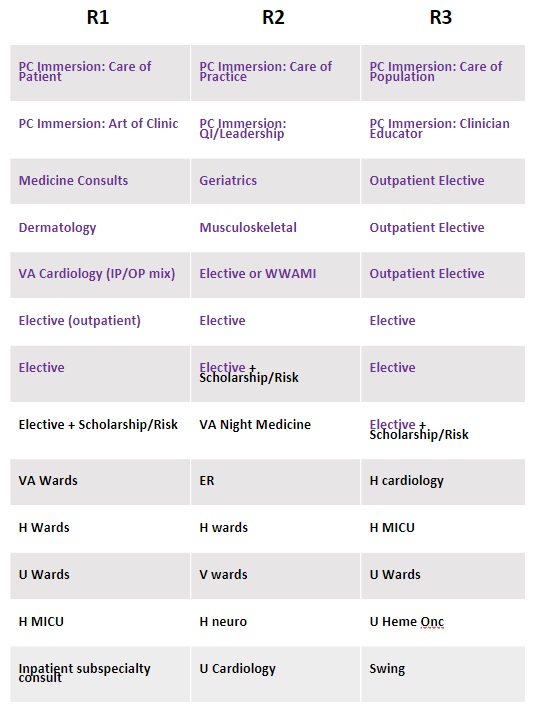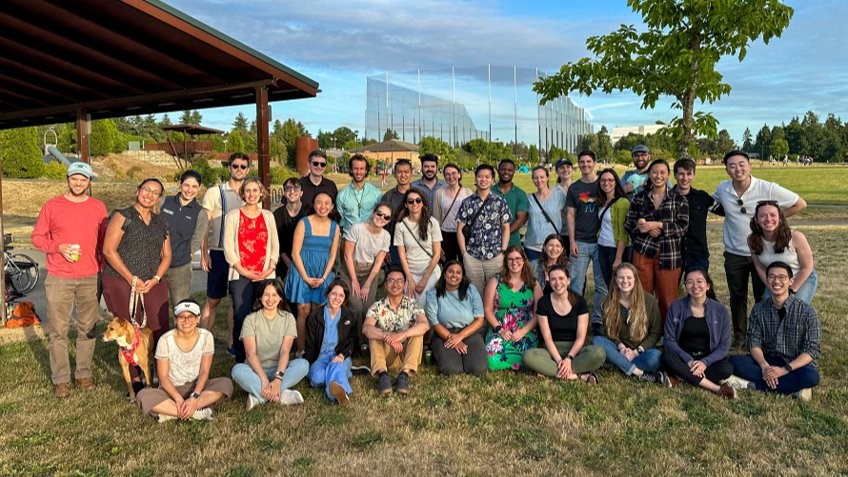Overview
The University of Washington Internal Medicine Primary Care (PC) Track trains the next generation of leaders in primary care internal medicine by providing comprehensive, immersive training in outpatient medicine, as well as clinical teaching, leadership, quality improvement, health systems, policy, and advocacy.
As a PC resident, you have the opportunity to spend the majority of your training in the outpatient setting honing core primary care skills. With two dedicated PC immersion blocks each academic year, you will also gain the expertise to thrive as a leader and advocate in your clinic and community.
You will build community with your PC track colleagues and form lasting relationships through various social activities held throughout the year, a full day PC retreat, and dedicated immersion blocks.
Throughout your residency, you will provide comprehensive primary care for your panel of patients at one of our program’s continuity clinics: Harborview’s Adult Medicine and Madison (HIV) Clinics, the University of Washington’s Roosevelt General Internal Medicine and Women’s Healthcare Clinics, the VA Puget Sound’s Primary Care and Women’s Healthcare Clinics, or the UW Belltown Neighborhood Clinic.
As a primary care track resident, you can also participate in both a clinical and/or non-clinical training pathway. Please see the detailed pathway descriptions here.
R1 year
Your R1 year is focused on becoming an outstanding internist for individual patients. You will acquire the knowledge and skills necessary to independently manage common and complex medical conditions, to develop personal systems of care that allow for efficient and high-quality care, and to hone patient-centered communication skills.
Core rotations include:
-
PC Immersion – Care of Patient – Block (summer) - your intern year begins with immersion block!
-
Mornings include didactic sessions on the management of acute and chronic conditions, physical exam skills, practice management and patient interactions, as well as interactive sessions including “Outpatient Procedures” “Primary Care Report” and “Clinic Skills” with your outpatient chief residents.
-
Afternoons are spent at your continuity clinic site caring for your panel patients in collaboration with your interprofessional clinic team.
-
PC Immersion – Art of Clinic – Block (winter)
-
In addition to selected high impact PC didactics, you will reflect on your development as a physician through narrative medicine, more deeply connect with your clinic patients through a “My Life My Story” project, and deep dive population health panel management processes for your patients
-
Outpatient rotations - 3-4 additional outpatient rotations, including a mix of primary care and subspecialty medicine, as well as a course called Patients, Physicians, and Community focused on care for vulnerable communities, health equity, advocacy, population health, and community-building.
R2 year
During your R2 year, you will continue to hone your medical knowledge in outpatient subspecialties and develop your leadership and practice management skills in the outpatient care setting. You will engage in clinic-based QI project development, clinic leadership training, peer observation and feedback, and exploration of innovative primary care delivery models.
Core rotations include:
-
PC Immersion – Care of Practice - Block (fall)
-
The focus of this experience is to build your clinic leadership and quality improvement skillset and strengthen your ability to work with the interprofessional care team to optimize the health of your panel of patients.
-
Didactics are delivered by specialists/subject matter experts and are tailored to your learning goals
-
You will work with your clinic partners to design and implement a practice improvement/QI project to improve care outcomes for your patients.
-
You will be trained as a peer clinical coach for your primary care classmates
-
Outpatient rotations in the R2 year include core PC track rotations such as geriatrics and musculoskeletal medicine blocks.
-
Electives - We offer a broad variety of outpatient clinical electives including HIV care, women’s health, gender affirming care, healthcare for individuals experiencing homelessness, addiction medicine as well as the opportunity to spend time on a WWAMI rotation, on an international rotation, or doing research or other scholarly work.
R3 year
During your R3 year, you will strengthen your skillset as a clinician educator and explore your role as a physician advocate in the health care system working to increase health equity in our community.
-
PC Immersion - Clinician Educator - Block (summer) You will co-immerse with new interns on their clinic immersion blocks as a near-peer teacher and coach, growing your educator toolkit
-
PC Immersion – Care of Population - Block (winter)
-
The focus of this block is to equip you with tools to advocate for the health of your community.
-
In teams, you will perform an equity analysis for one of your primary care patients experiencing a negative health outcome caused by social and structural determinants of health and identify system-level interventions. The health equity analysis will be the springboard for identifying key “issue” for an advocacy action plan. You will meet with advocacy experts in didactic sessions to explore best practices in institutional, municipal, state and federal advocacy, as well as experts in hot topics in health care. Outpatient rotations – You can spend the majority of your R3 year in the outpatient setting, including clinical and pathway electives; rural, community-based, or international rotations; or doing research or other scholarly work.
Sample Rotational Schedule for PC track residents: (individual schedules may vary):




